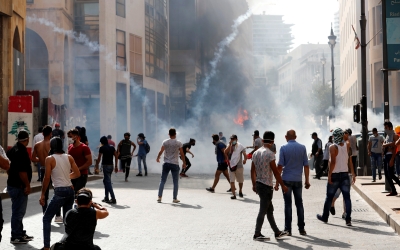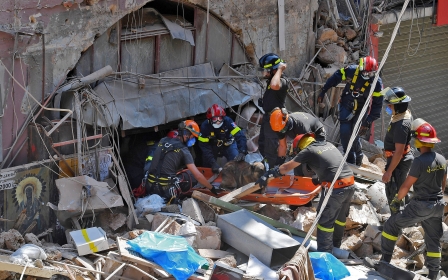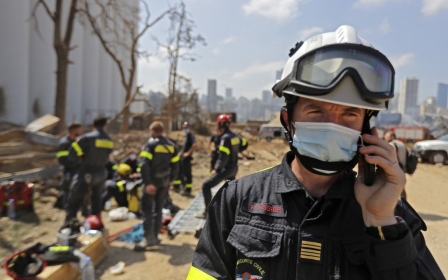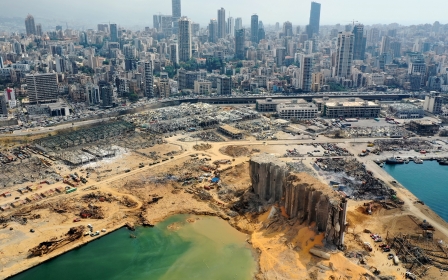Beirut explosion: Lebanon's PM calls for early elections as protests turn violent
Lebanese Prime Minister Hassan Diab on Saturday evening called for early parliamentary elections, as protests raging against the political class and deadly port explosion turned violent in central Beirut.
"It is not possible to exit the country's structural crisis except for early parliamentary elections that would produce a new political class," the Lebanese premier said in a hastily arranged speech delivered at a press conference.
"I call on all sides to agree on the next stage, and I am ready to take responsibility for two months until they agree."
Diab added that he would submit a proposal to hold early elections to the cabinet on Monday.
'It is not possible to exit the country's structural crisis except for early parliamentary elections that would produce a new political class'
- Prime Minister Hassan Diab
Thousands of protesters in central Beirut - some of whom had been clashing with security forces for hours - celebrated the announcement. Over 170 protesters have been wounded so far.
New MEE newsletter: Jerusalem Dispatch
Sign up to get the latest insights and analysis on Israel-Palestine, alongside Turkey Unpacked and other MEE newsletters
Dozens of protesters stormed the energy and economy ministries and also the foreign ministry, where the demonstrators were led by retired army officers, who declared it the "headquarters of the revolution" and burned a framed portrait of President Michel Aoun.
"President Michel Aoun did not respect his oath," said retired general Samer Rammah, who led the occupation. "I had hope in Aoun [but now] this republic is run like a farm."
The Lebanese army later drove the protesters out of the building.
Demonstrators also stormed and trashed the offices of the Association of Lebanese Banks, television footage showed.
About 10,000 people had gathered in Martyrs' Square, some throwing stones. Police fired tear gas when some protesters tried to break through the barrier blocking a street leading to parliament, according to Reuters.
Aya Majzoub, a Lebanon and Bahrain researcher at Human Rights Watch, posted footage on Twitter allegedly showing her being beaten by the army and having her phone thrown away.
A policeman had died during the clashes, a spokesman said. A policeman at the scene said the officer had fallen into an elevator shaft in a nearby building after being chased by protesters.
'We are all in pain. We are all wounded'
Protests have swept across central Beirut and neighbouring areas, calling for the government to be held accountable over Tuesday's explosion at Beirut port, which killed more than 150 and wounded over 5,000 people. Over 300,000 people had been rendered homeless, as much of the city has suffered from huge material damage.
A fire in a port warehouse containing 2,750 tonnes of ammonium nitrate, a highly explosive material, caused the massive blast, which was felt as far away as Cyprus. The material had sat in the port since 2013, and all attempts by officials to have it moved had been rebuffed.

The majority of Lebanese say it is symptomatic of the corruption and negligence that plagues the government and state institutions.
Diab's government has announced an internal investigation, which will take place over the next five days, though many have called for an independent investigation instead.
"We are all in pain. We are all wounded," Diab said, addressing the angry protesters. "The investigation will reveal the truth, and it won't take long."
Diab was appointed in December 2019 while the country faced a popular uprising against the spiralling economic crisis. However, the situation has only worsened since he took office.
The Lebanese pound has lost 80 percent of its value against the US dollar and food prices have doubled, while the coronavirus pandemic has added extra pressure on the country's floundering economy.
It is estimated that 50 percent of Lebanon's population are living below the poverty line.
"The cabinet, which won parliament's confidence, responded to the demands of the revolution," Diab said. "The country needs an administrative, financial and political solution."
In the days following the blast, foreign countries have offered assistance and sent aid and advisers to Beirut. However, there have been accusations that their efforts have been rebuffed and impeded by authorities.
Diab adamantly denied allegations that his government had withheld humanitarian aid being sent to the country.
"The country needs all the aid and support it can get," Diab said. "The government thanks everyone who stood with Lebanon through this difficult period."
Middle East Eye delivers independent and unrivalled coverage and analysis of the Middle East, North Africa and beyond. To learn more about republishing this content and the associated fees, please fill out this form. More about MEE can be found here.




